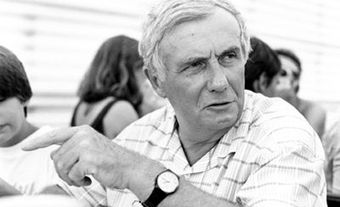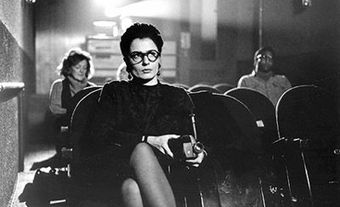
Terence Macartney-Filgate
Terence Macartney-Filgate, director, producer, writer, cinematographer (b at England 1924). Terence Macartney-Filgate served with the United Kingdom's Royal Air Force (RAF) as a young man during World War II. He attended Oxford University after the war to study economics and politics, and held down a succession of jobs before immigrating to Canada. In 1954 he joined the NATIONAL FILM BOARD (NFB) as a writer. The technical knowledge he had picked up while in the RAF served him well, and he wrote commentary for sponsored films at the NFB from 1954 to 1957, occasionally directing as well. He began to associate with a group of filmmakers (Wolf Koenig, Roman Kroitor, William Greaves, Stanley Jackson, John Spotton) attached to Unit B, which was considered the most creative of the many units that made up the NFB's early production structure.While at Unit B, Macartney-Filgate worked extensively as a director and cinematographer on the groundbreaking Candid Eye series of film portraits of Canadian life. Generally considered to be the launching pad of "cinema vérité" in Canada, pioneers of the form, NFB filmmakers Michel Brault and Pierre Perrault, never used the term to describe their work. They found it too pretentious (its source was the French film school and roughly translates as "film truth"). Brault preferred the term cinéma direct, or direct-cinema as it became known in English Canada and the US. The NFB was able to sell a series of 14 30-minute shorts to the CBC, and Candid Eye (1958-61) was broadcast. Executive producer Tom DALY oversaw the filmmakers, and the direct-cinema films were shot on location using new lightweight equipment with an emphasis on ordinary daily events.
Macartney-Filgate directed 7 of the 14: The Days before Christmas (1958, which he directed with Stanley Jackson and Wolf Koenig), Blood and Fire (1958), Pilgrimage (1958), Police (1958, which he also photographed with Koenig), The Back-Breaking Leaf (1959, again shot with Koenig), End of the Line (1959, which he shot with Georges Dufaux) and Cars in Your Life (1960). He also shared the photography credits with Koenig on Memory of Summer (1958), Country Threshing (1958), and perhaps the most famous of the 14, Glenn Gould: On the Record and Glenn Gould: Off the Record (1959).
Due to philosophical differences, Macartney-Filgate left the NFB in 1960 to work independently in the US, where he joined Robert Drew Associates, whose members included pioneering documentary filmmakers Richard Leacock, D.A. Pennebaker and Albert Maysles. In 1960, this group produced for Time-Life Broadcast 3 films: Yanqui, No!, Eddie (On the Pole) and Primary. In particular, Primary, a seminal documentary about the 1960 Wisconsin Democratic presidential primary campaign between senators John F. Kennedy and Hubert H. Humphrey, defined the American direct-cinema style. Macartney-Filgate won a Peabody Award (the Institutional Award for Television Education) for his 1964 documentary, Changing World: South African Essay.
Macartney-Filgate completed the Oscar-winning documentary Robert Frost: A Lover's Quarrel with the World (1963) for producer Robert Hughes after original director Shirley Clarke bowed out, but her later claims of being sole director resulted in Macartney-Filgate's work on the film not being credited. He returned to the NFB briefly to work on the Lewis Mumford on the City series (1963). Mumford was a leading American theorist on the growth of cities, and the bestselling author of The City in History (1961). Macartney-Filgate co-directed 4 of the 6 films. In New York City, he worked with African-American filmmaker William Greaves (who had previously worked on the Candid Eye series) and made a number of films for television on writers such as Harold Pinter, Vladimir Nabokov, Marshall McLuhan and Henry David Thoreau, before moving on to freelancing for the CBC and NFB back in Canada.
For the NFB he made The Hottest Show on Earth (1977), a live-action/animated short that he directed with Wolf Koenig and Derek Lamb (it won a Canadian Film Award for short documentary). For the CBC he directed a number of major documentaries and docudramas, including Lucy Maud Montgomery: The Road to Green Gables (1975), Grenfell of Labrador: The Great Adventure (1977) and Fields of Endless Day (1978). Perhaps his 2 most accomplished films made during this period were for the CBC: Dieppe 1942 (1979), which was co-written by the author Timothy FINDLEY and nominated for 7 GENIE AWARDS, and Timothy Findley: Anatomy of a Writer (1992), which won the Donald BRITTAIN Award for best social/political documentary program at the 1993 GEMINI AWARDS.
In 1995 he directed Canada Remembers, a 3-part series about Canada's involvement in the Second World War for the NFB, and in 2007 he completed Raising Valhalla, a television documentary about the opening of a new stage exclusively designed for opera, the Four Seasons Centre for the Performing Arts in downtown Toronto, and its staging of Wagner's complete Ring Cycle.
Terence Macartney-Filgate has directed, written, produced or photographed more than 100 films in his long career.

 Share on Facebook
Share on Facebook Share on X
Share on X Share by Email
Share by Email Share on Google Classroom
Share on Google Classroom


